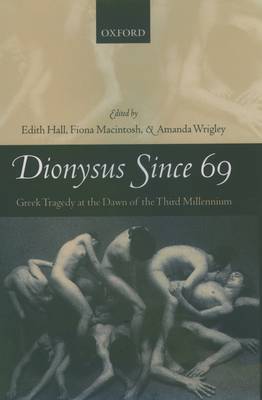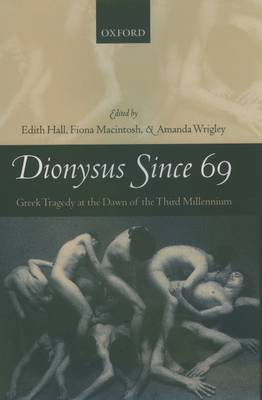
Bedankt voor het vertrouwen het afgelopen jaar! Om jou te bedanken bieden we GRATIS verzending (in België) aan op alles gedurende de hele maand januari.
- Afhalen na 1 uur in een winkel met voorraad
- In januari gratis thuislevering in België
- Ruim aanbod met 7 miljoen producten
Bedankt voor het vertrouwen het afgelopen jaar! Om jou te bedanken bieden we GRATIS verzending (in België) aan op alles gedurende de hele maand januari.
- Afhalen na 1 uur in een winkel met voorraad
- In januari gratis thuislevering in België
- Ruim aanbod met 7 miljoen producten
Zoeken
Dionysus Since 69
Greek Tragedy at the Dawn of the Third Millennium
Edith Hall, Fiona Macintosh
Hardcover | Engels
€ 426,95
+ 853 punten
Omschrijving
Greek tragedy is currently being performed more frequently than at any time since classical antiquity. This book is the first to address the fundamental question, why has there been so much Greek tragedy in the theatres, opera houses and cinemas of the last three decades? A detailed chronological appendix of production information and lavish illustrations supplement the fourteen essays by an interdisciplinary team of specialists from the worlds of classics, theatre studies, and the professional theatre. They relate the recent appeal of Greek tragedy to social trends, political developments, aesthetic and performative developments, and the intellectual currents of the last three decades, especially multiculturalism, post-colonialism, feminism, post-structuralism, revisions of psychoanalytical models, and secularization.
Specificaties
Betrokkenen
- Auteur(s):
- Uitgeverij:
Inhoud
- Aantal bladzijden:
- 500
- Taal:
- Engels
Eigenschappen
- Productcode (EAN):
- 9780199259144
- Verschijningsdatum:
- 11/03/2004
- Uitvoering:
- Hardcover
- Formaat:
- Genaaid
- Afmetingen:
- 145 mm x 221 mm
- Gewicht:
- 839 g

Alleen bij Standaard Boekhandel
+ 853 punten op je klantenkaart van Standaard Boekhandel
Beoordelingen
We publiceren alleen reviews die voldoen aan de voorwaarden voor reviews. Bekijk onze voorwaarden voor reviews.









